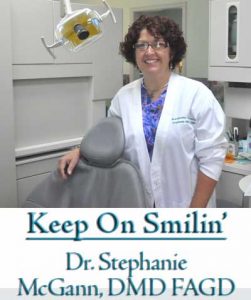By Dr. Stephanie McGann, DMD FAGD, Columnist, The Times
 We are in complicated and trying times to be sure. This month I would like to spend a few moments thanking another group of unsung heroes in our current crisis. Public health professionals have gotten ignored or “thrown under the bus” at times during this pandemic.
We are in complicated and trying times to be sure. This month I would like to spend a few moments thanking another group of unsung heroes in our current crisis. Public health professionals have gotten ignored or “thrown under the bus” at times during this pandemic.
I thought it prudent to share all of things we take for granted today that could be a whole lot different if it were not for the diligent and hard working trained members of the public health team.
First, what is a public health professional? People in the field of public health focus on preventing disease and injury by evaluating, studying and developing solutions to health related concerns. When students train in public health, they study statistics, environmental science, epidemiology (the branch of medicine that deals with incidence, distribution and control of diseases or health risks) and more. They implement educational programs, develop policies, administer services, conduct research and perform statistical analysis, then work to develop protocols for healthcare to achieve these goals. There are physicians, nurses, lay professionals all who may have specific training in public health. The recommendations of public health teams is always based on science, research, and analysis, never on profit or politics.
Over the years since the health of our population has been a concern there have been huge advancements mainly in part because of hard work on the part of public health professionals. Our expanded life expectancy is just one shining example of public health success.
Modern preventive dental care has its roots in a turn of the century observation and a public health experiment in Grand Rapids Michigan. These people of Michigan approved the first test of community water fluoridation that paved the way to a dramatic reduction in dental decay among children. We take for granted that today’s kids won’t have nearly weekly visits to the dentist to get teeth pulled or filled.
Today there are dental public health professionals analyzing and implementing programs that save individuals and public sponsored health plans millions of dollars each year. Prevention is the best solution every time for both the patient and the taxpayer.
Saving money and preventing more costly problems is the key feature of all public health programs both medical and dental. Public health is an important part of everyday life. Implementing research into polio vaccine is what made the iron lung an artifact of a by-gone age.
One of the most successful public health programs provides an example of what can be accomplished when the government, the private sector, academia, and community organizations work together. We are nearing the 50th anniversary of the establishment of the National High Blood Pressure Education Program (NHBPEP). This public-private partnership contributed to an 80 percent reduction in strokes and a 70 percent reduction in heart attacks in the United States. It is considered one of the greatest public health accomplishments of the twentieth century. Some of us are old enough to remember the mass education and inoculations for smallpox that made the disease nearly disappear. Sometime public health officials track new diseases on a global scale, putting into place mitigation efforts to help minimize the destructive capability of emerging diseases.
Public health professionals also may serve as an independent audit system for medications, treatments and protocols. This tracking and research by professionals not related to drug companies or health systems who could profit, provides a necessary check and balance in our environment of for-profit healthcare.
Today it is with great sadness I must spend a minute mourning the loss of respect our nation has shown for these well trained and competent professionals.
Since the advent of the internet and social media many Americans have become self-proclaimed experts. They share opinions disguised as facts. We have turned our back on professionally trained and educated people who never made a lot of money but did their jobs for the betterment of society. So to all of the individuals who have studied public health in college or professional school and worked tirelessly to make a difference, I apologize.
What can we do? Listen to your physicians, take the advice of public health team members, understand that in times of crisis the information changes as the problem is studied more deeply. Use the internet to read real information, not blogs or what someone’s neighbor posted on Facebook. Public health is about using science, medicine, math and statistics to give you and your neighbor a healthier tomorrow.
Dr. Stephanie McGann, who has more than two decades of dental practice experience, is a resident of the Unionville area and owns and practices at Rainbow Valley Dental, in Valley. She is a past President of the Chester/Delaware Dental Society and she is a Fellow of the Academy of General Dentistry.






